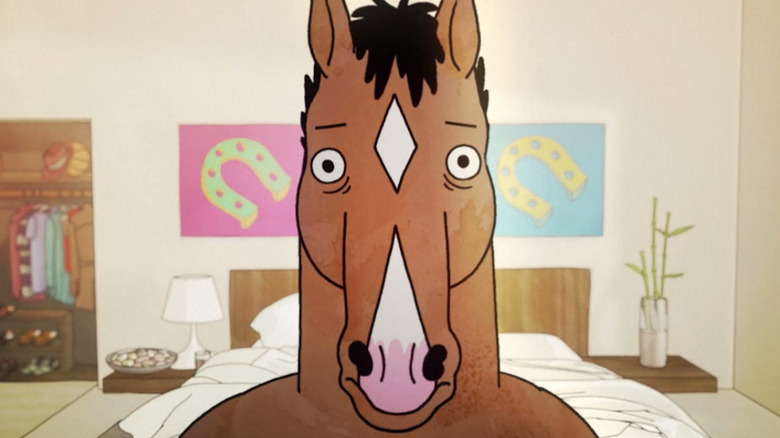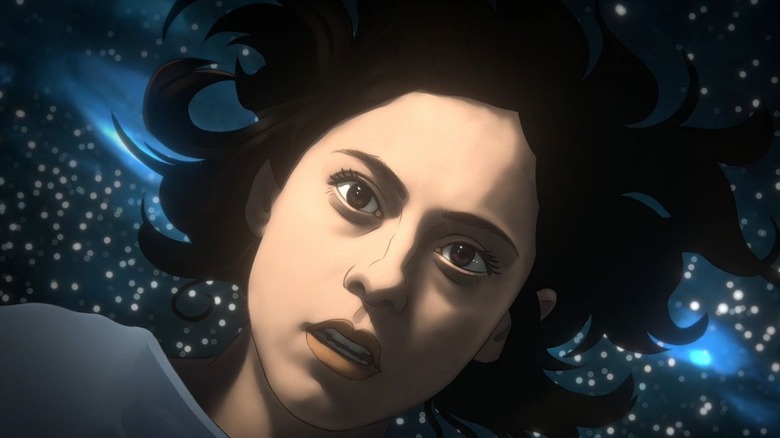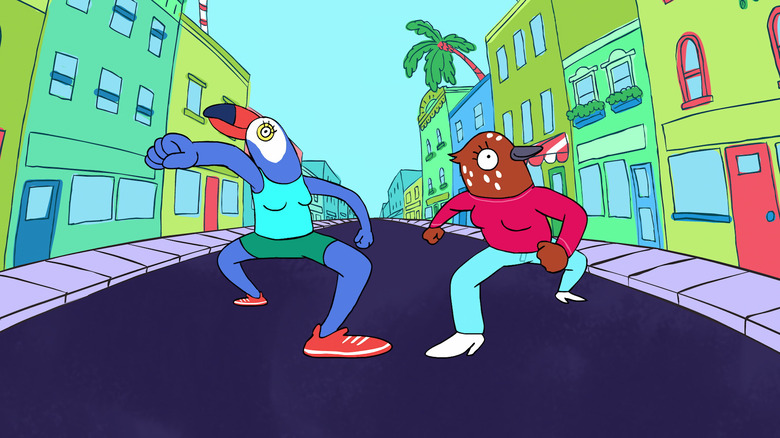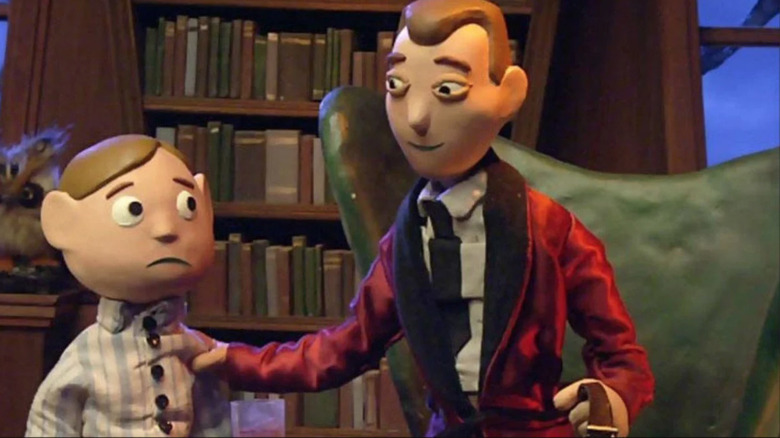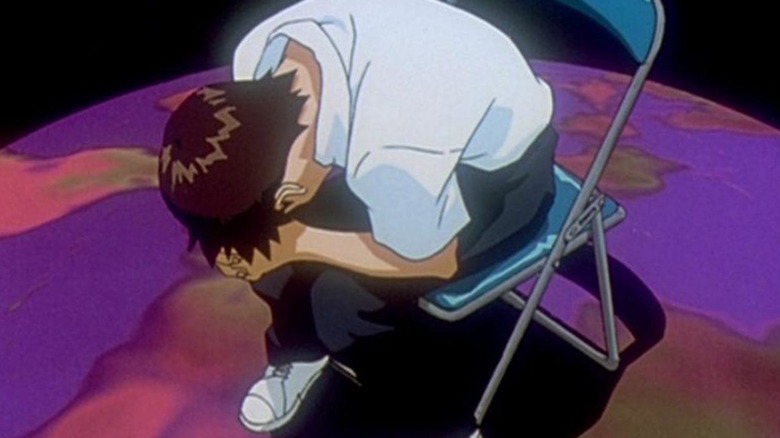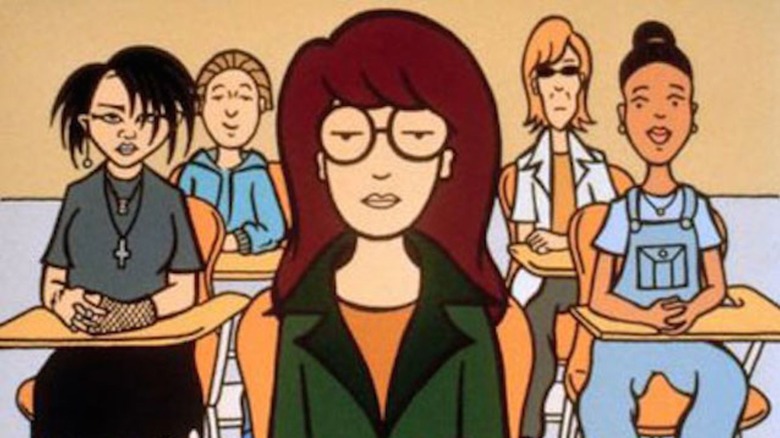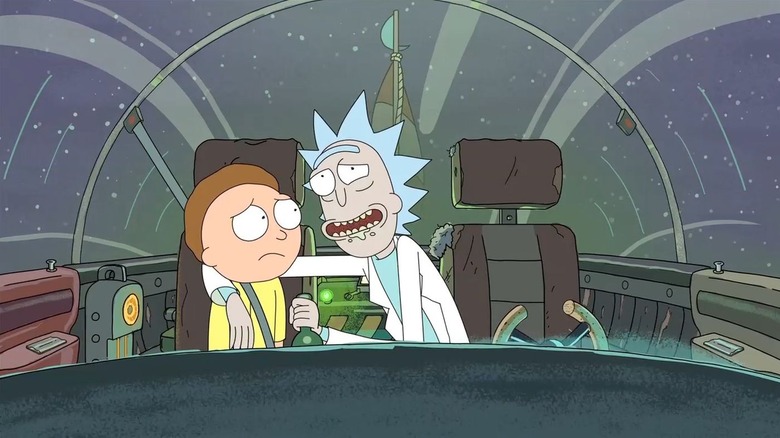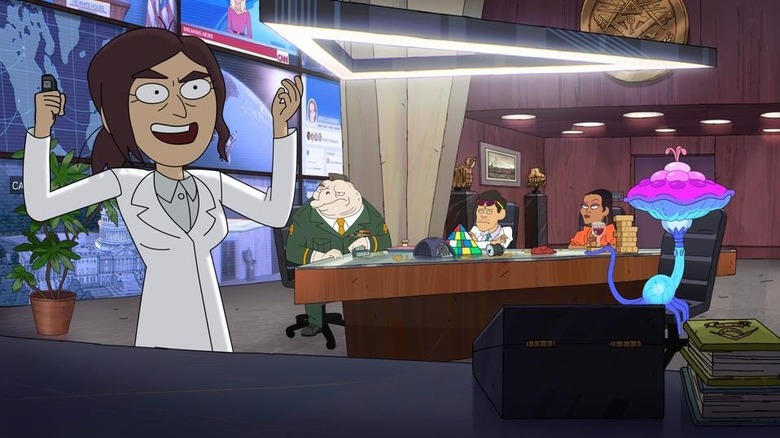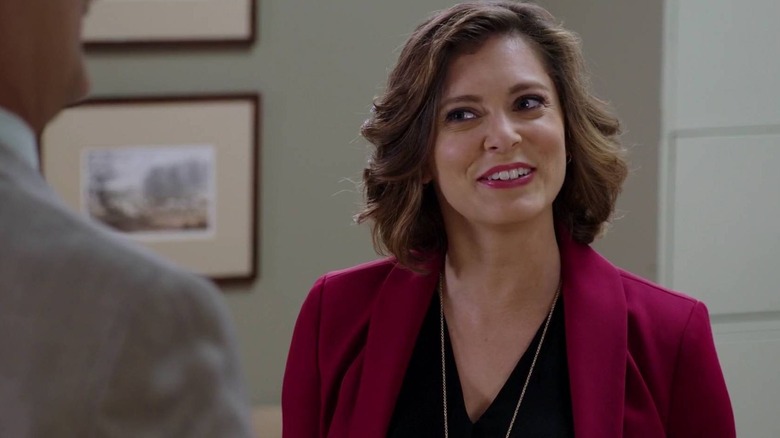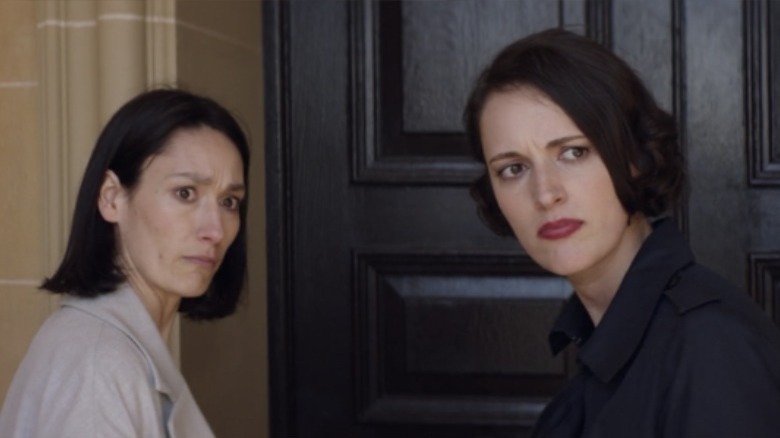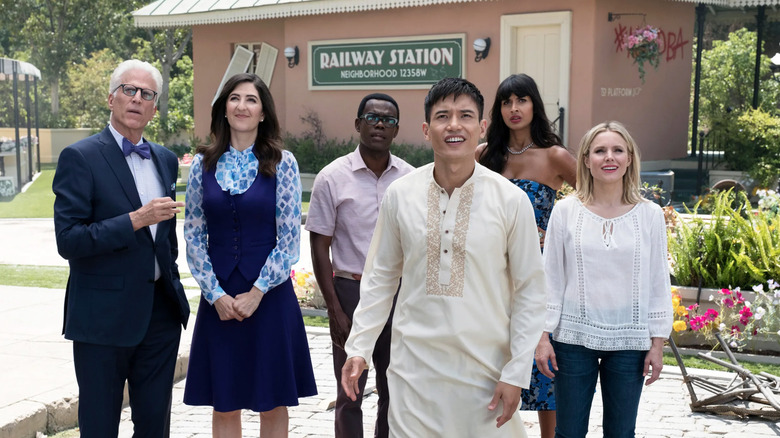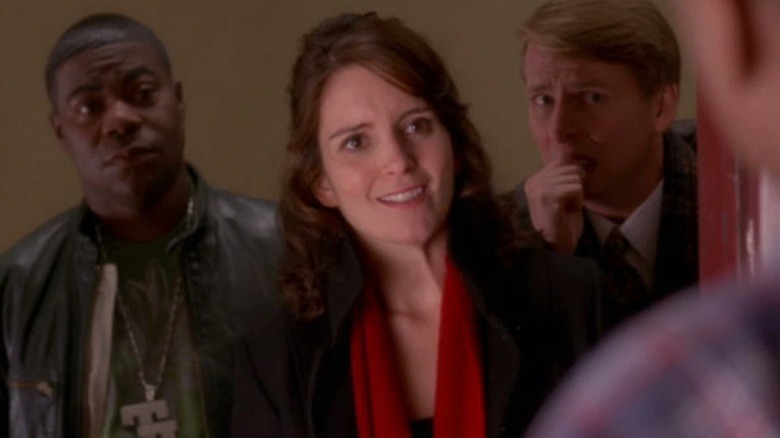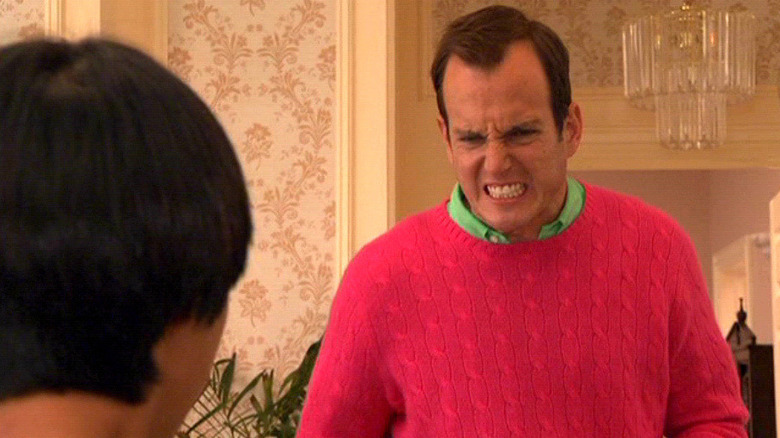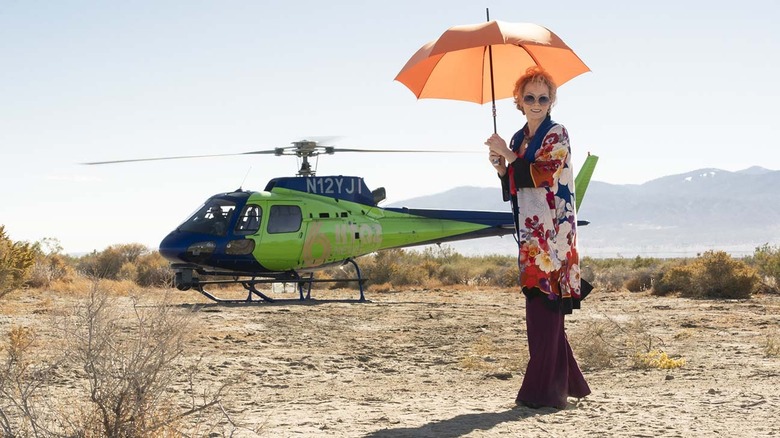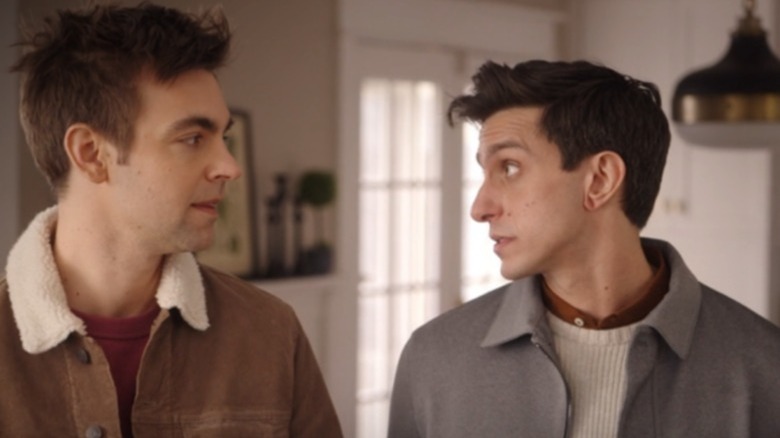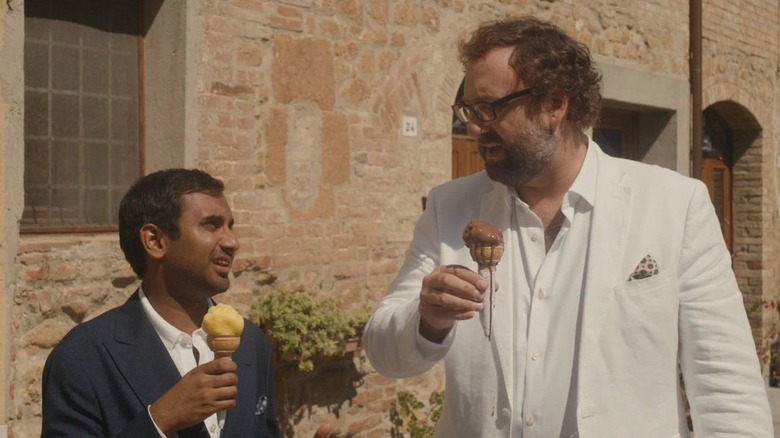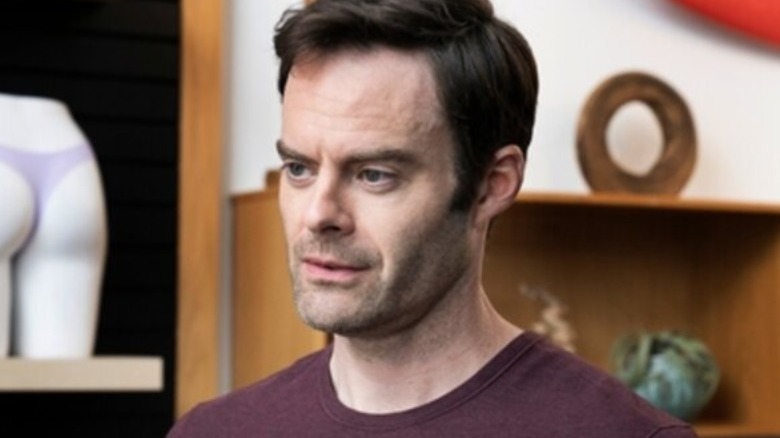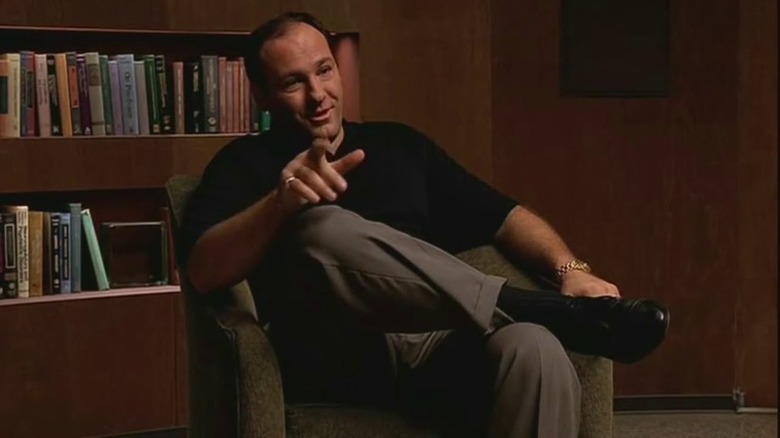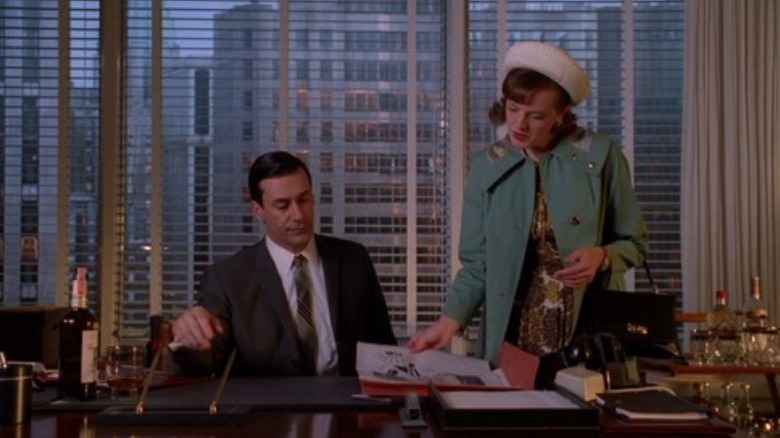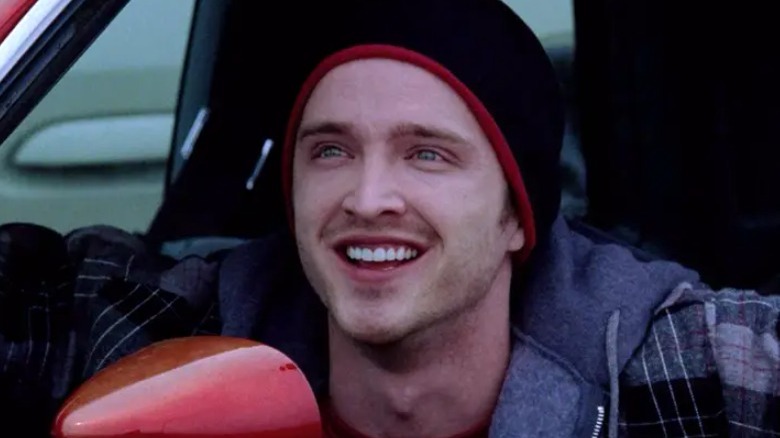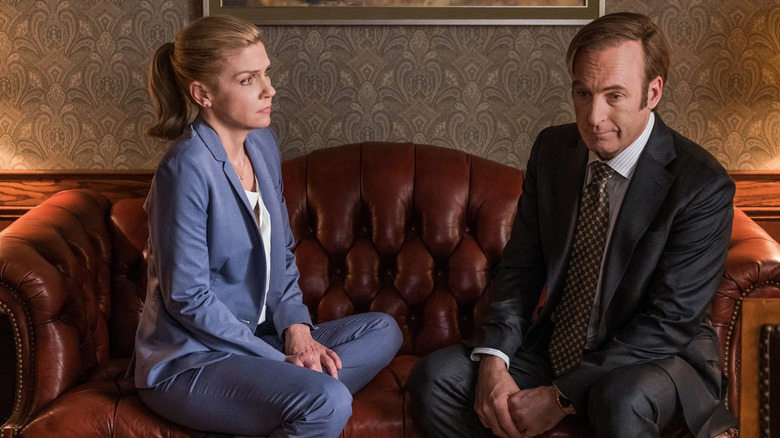20 Shows Like BoJack Horseman You Need To Watch
When "BoJack Horseman" first premiered on Netflix in 2014, many critics initially dismissed it as your run-of-the-mill adult cartoon comedy. Those who stuck around to the end of that first season, however, were rewarded with a complex character study that delved into serious issues and heavy emotions without sacrificing hilarity. Raphael Bob-Waksberg's "sad horse show" expertly combined intense drama and witty comedy over six seasons. With brilliant artistic design by Lisa Hanawalt and a voice cast including Will Arnett, Alison Brie, Paul F. Tompkins, Amy Sedaris, and Aaron Paul, "BoJack Horseman" has become celebrated as one of the best animated shows on Netflix.
There are many different elements that make "BoJack Horseman" great, which means that there are many different types of shows that can be recommended to fans of the series. There are other adult cartoons, both comedic and dramatic-oriented ones, including some from the "BoJack Horseman" creative team. There are also live-action sitcoms that evoke different aspects of "BoJack Horseman," be it the explorations of morality and mental health issues or the satire of Hollywood. Then there's the wave of popular prestige dramas centered around antiheroes, a trend which "BoJack Horseman" was at once a part of and a critical reaction to. None of these shows are exactly like "BoJack Horseman," but all have something that should appeal to "BoJack Horseman" fans.
Undone
"BoJack Horseman" creator Raphael Bob-Waksberg's second show, "Undone," is like nothing else on TV. Co-created by Katie Purdy, whose writing credits on "BoJack Horseman" include the Writers Guild of America award-winning episode "Time's Arrow," this Amazon Prime psychological comedy-drama takes its predecessor's more experimental streak and shifts it into overdrive. The show's heroine, Alma (Rosa Salazar), is trying to solve the mystery surrounding the mysterious death of her father (Bob Odenkirk). Communicating with her dad's ghost, Alma beings to wonder if she might have schizophrenia or might be developing the powers of a shaman — or both.
"Undone" uses rotoscope animation in a style similar to the movie "Waking Life" to simulate Alma's loosening grip on reality. It's a series that pushes the limits of what American animation is capable of. The eight-episode first season is a perfectly satisfying story in and of itself, but "Undone" isn't done yet, as Variety reports that Amazon quickly renewed the series for a second season.
Tuca & Bertie
"Tuca & Bertie" comes from the mind of "BoJack Horseman" character designer Lisa Hanawalt. This critically acclaimed sitcom centers around a hard-partying, newly sober toucan named Tuca (Tiffany Haddish) and her neurotic, hard-working song thrush friend Bertie (Ali Wong). The series was controversially canceled by Netflix after one season in 2019, but fortunately, the series was revived by Adult Swim and renewed for more seasons.
The anthropomorphic style of "Tuca & Bertie" is instantly recognizable to "BoJack Horseman" fans, but "Tuca & Bertie" is its own show with slightly different priorities. The humor in "BoJack Horseman" was driven primarily by its writing, while "Tuca" places a greater emphasis on visual gags and creative animation. If "BoJack" often became overpoweringly depressing, "Tuca" mostly keeps a lighter and more optimistic tone, even while it sensitively touches on heavy subject matter like addiction and sexual assault. Fans of "Broad City" will find a lot to enjoy in how "Tuca and Bertie" approaches female friendship.
Moral Orel
The transition in "BoJack Horseman" Season 1 from a purely comedic cartoon into an emotionally harrowing drama was shocking but not unprecedented in the history of adult animation. The biggest precedent happens to be "Moral Orel," a stop-motion Adult Swim series created by Dino Stamatopoulos, who some might recognize as Starburns from "Community." Drawing from the style of the Christian cartoon series "Davey and Goliath," the series started as a jokey satire of religious fundamentalism that eventually dropped the jokes and went all-in on trauma.
"Moral Orel" first experimented with its more serious direction in the intended Season 1 finale, "The Best Christmas Ever," which was inexplicably aired as the series premiere. According to Vulture, positive feedback on that episode led to more character development in Season 2, including the ultra-dark finale "Nature." Season 3 abandoned any pretense of comedy entirely, and Adult Swim canceled the show in fear it was getting too bleak.
Neon Genesis Evangelion
When discussing depictions of depression in animation, the 1995 anime "Neon Genesis Evangelion" still stands out as one of the most powerful. "Evangelion" comes from a very different genre from "BoJack Horseman," being a giant robot action series rather than a sitcom, but both shows subvert the formulas of their respective genres in favor of a deep dive into how their characters deal with mental illness and interpersonal relationships.
Polygon observes that "Evangelion" and "BoJack" both excel at using stylized art and limited animation techniques to convey characters' mental states. Their genre subversions, fortunately, don't come at the cost of genre pleasures. Just as "BoJack" is still a very funny sitcom even when its plot goes in more serious directions, "Evangelion" remains one of the most exciting mecha anime around even as it shifts focus towards psychological introspection. That is, right until its final two episodes controversially went for pure introspection, leading to the "Neon Genesis Evangelion: The End of Evangelion" movie providing a more action-driven but still extremely controversial alternate ending.
Daria
In the "BoJack Horseman" Season 3 episode "That's Too Much, Man!," Sarah Lynn comments on what Diane Nguyen's "deal" is and decides that she's "basically Asian Daria." That might not be the most accurate assessment of Diane's character beyond her intelligence and similar fashion sense, but the reference does point to how "Daria" was a major influence on Raphael Bob-Waksberg's writing style for "BoJack Horseman."
The "Beavis and Butthead" spinoff series initially hooked viewers with the biting hyper-cynical perspective of its teen protagonist, but "Daria" kept them coming back thanks to its unusually nuanced character development. Talking about the show with Rolling Stone, Bob-Waksberg said, "It did a good job of showing that smart people aren't always right and stupid people aren't always bad. I want to give my characters nuance. You think you have these archetypes, but then when you start exploring the character, you go into their nooks and crannies."
Rick and Morty
"BoJack Horseman" and "Rick and Morty" are frequently compared as some of the most popular adult cartoons of the 2010s. Both are cleverly-written dark comedies about antiheroes struggling with depression while hurting those closest to them. While both shows are brilliant, it's worth acknowledging just how different their approaches to their similar material truly is.
As "BoJack Horseman" is heavily serialized, the consequences of BoJack's misdeeds clearly weigh upon him, and the show takes great pains to deglamorize his character. "Rick and Morty," in contrast, operates in a mostly-episodic mode where mass death is shrugged off every week, and Rick can jump into another dimension whenever his current one gets damaged beyond repair. Though Rick carries as much toxicity as BoJack, it's easier to view his intelligence and hyper-competence as "cool," resulting in more fans missing the point that he's not supposed to be a role model.
Inside Job
The newest show on this list, "Inside Job," is an animated sci-fi sitcom created by Shion Takeuchi for Netflix. This satirical comedy takes place in the shadow government organization Cognito Inc., where (almost) every conspiracy theory is true but not in the ways you might think. The protagonist, Reagan Ridley (Lizzy Caplan), is a socially-challenged engineer whose horrible father, Rand (Christian Slater), is Cognito's founder.
As noted by USA Today, "BoJack Horseman" was Netflix's first foray into original adult animation. "Inside Job" is a strong example of how the streaming service continues to serve the medium. As in "BoJack," the episodic stories in "Inside Job" offer wacky alternate-reality takes on current events while developing characters whose ongoing stories involve serious struggles with mental health issues and abusive families. The jokes are fast, funny, and pop culture-savvy, but it's the character-driven drama that ends up making the biggest impact on the viewer by the end of the first season.
Crazy Ex-Girlfriend
Arguably, the live-action show with the most substantial similarities to "BoJack Horseman" is The CW's mental illness musical romantic dramedy "Crazy Ex-Girlfriend." Created by and starring Rachel Bloom, the story follows lawyer Rebecca Bunch, who leaves her high-paying job to travel across the country in an attempt to reconnect with her ex-boyfriend Josh Chan (Vincent Rodriguez III). Rebecca is a theatre geek who likes to imagine her life as a musical, and the series features multiple songs per episode across almost every genre.
Like BoJack, Rebecca is sympathetic in her struggles with mental illness, but her relatable characteristics don't negate the fact her actions often genuinely hurt people. She's a complex character, and all of her friends, co-workers, and love interests have similar complexities. Running for four seasons from 2015 to 2019, "Crazy Ex-Girlfriend" is a cult favorite that uses a unique comedic style to dig deep into issues of morality, forgiveness, and relationships.
Fleabag
Created by and starring Phoebe Waller-Bridge and adapted from her one-woman show of the same name, "Fleabag" explores love, sex, grief, and guilt from the viewpoint of Fleabag, the fourth-wall-breaking owner of a guinea pig-themed cafe. Like "BoJack Horseman," this is one of those comedies where viewers came for the laughs but stayed for the sadness, getting emotionally invested in the life of a charming yet deeply flawed antihero.
"Fleabag" is one of the shortest series on this list, running for two seasons (one in 2016, one in 2019) of six episodes each. The second season, in which Fleabag pursues an affair with a sexy priest played by Andrew Scott, won six Emmys, including outstanding comedy series. According to Metacritic, it made more top 10 lists for the best TV shows of the 2010s than any other show. Despite its popularity, Waller-Bridge is done with "Fleabag," having told the story she set out to tell.
The Good Place
What does it mean to be a good person? The question which weighed so heavily on BoJack Horseman is also the question Eleanor Shellstrop (Kristen Bell), Chidi Anagonye (William Jackson Harper), Tahani Al-Jamil (Jameela Jamil), and Jason Mendoza (Manny Jacinto) contend with in Mike Schur's beloved comedy "The Good Place." The show's main human characters begin the series having recently passed away and found residency in an afterlife calling itself "The Good Place," but do they deserve to be there? Does anyone?
If you haven't seen "The Good Place," we'll avoid spoiler discussions, but needless to say, the story takes many wild plot twists while pondering many of philosophy's biggest questions. The cast, which includes Ted Danson as the "architect" Michael and D'Arcy Carden as "not a girl, not a robot" Janet, is great and keeps the laughs coming fast. Running for four seasons on NBC from 2016-2020, "The Good Place" is a perfect series for binge-watching.
30 Rock
"BoJack Horseman" keeps Hollywood's constant search for the next big hit TV show or movie idea squarely in its sights. Along the way, it looks at the dark side of fame and the ridiculousness of celebrity culture. If you love the showbiz satire side of "BoJack Horseman," then you'll find plenty to laugh about in Tina Fey's 2006-2013 NBC sitcom, "30 Rock."
"30 Rock" follows the production of "TGS with Tracy Jordan," a "Saturday Night Live" style sketch show of dubious quality. The show's ensemble includes iconic performances by Fey, Alec Baldwin, Tracy Morgan, Jane Krakowski, and Jack McBrayer, among other comedic talents. Making fun of entertainment, politics, and its own network, "30 Rock" moves at such a fast pace that The AV Club once compared it to "a live-action cartoon." Not everything in the show has aged gracefully, as The Wrap reports that four full episodes have been pulled from streaming due to offensive content, including the use of blackface. However, when "30 Rock" is at its best, the jokes still land more often than they offend.
Arrested Development
Before he was the voice of BoJack Horseman, Will Arnett was best known for playing Gob Bluth, the incompetent magician from "Arrested Development." Running for three seasons from 2003-2006 on FOX and later revived for two more seasons on Netflix from 2013-2019, creator Mitch Hurwitz's cult-favorite series took the idea of the dysfunctional family sitcom to the extreme with its cast of formerly wealthy amoral eccentrics.
Though it struggled in the ratings, critics have widely considered the initial run of "Arrested Development" to be one of the best TV shows ever made. The show's multilayered running gags and extremely elaborate joke set-ups influenced many sitcoms that have emerged since, including "BoJack Horseman." Its complexity might have hurt its success on network TV, but rewarding binge-watching on DVD and streaming, which explains why it was the ideal show for Netflix to bring back. Opinions on the Netflix seasons of "Arrested Development," however, were more mixed.
Hacks
Another story of an aging comedy star coming on hard times and working with a younger writer to seek new relevance, "Hacks" premiered on HBO Max in 2021 to rave reviews. It was nominated for 15 Emmys and won three later that year. Deborah Vance, the Las Vegas standup comedian played by Jean Smart, is far more talented and successful than BoJack Horseman ever was, but she's as prickly and problematic a personality as the "Horsin' Around" star.
One of the things that makes "Hacks" interesting is that Deborah's new writer happens to be similarly problematic. Unlike Diane Nguyen, who generally served as a voice of reason in "BoJack Horseman," Ava Daniels (Hannah Einbinder) in "Hacks" is as spoiled and selfish as her boss. Unlike the leads of "Crazy Ex-Girlfriend" or "The Good Place," there's no redemption in sight for the leading women of "Hacks" — something critics at Jezebel have found refreshing.
The Other Two
Another showbiz comedy that's flown relatively under the radar but is definitely worth watching, "The Other Two" focuses on the less-successful older siblings of the 13-year-old pop star known as ChaseDreams (Case Walker). Brooke Dubek (Heléne Yorke) doesn't know what she wants to do with her life after leaving her career as a professional dancer. Cary Dubek (Drew Tarver) knows that he wants to be an actor but has little success when it comes to booking roles.
The first season of "The Other Two" premiered on Comedy Central in 2019; the series moved to HBO Max for its second season in 2021 due to Comedy Central's focus shifting away from live-action sitcoms towards adult animation (via TVLine). Created by former "Saturday Night Live" writers Chris Kelly and Sarah Schneider, the series combines specific satire of the entertainment industry with universally relatable themes of struggling through one's twenties.
Master of None
Recommending "Master of None" now comes with a few huge asterisks. The sexual misconduct allegations against Aziz Ansari now make his former persona as an expert in matters of love and romance ring false. Ansari doesn't appear on-screen in the show's third season, which was made after the allegations, but that season completely abandoned any pretense of comedy and earned more mixed reviews as a result.
It's sad that the show is now somewhat tainted in these ways because there's genuinely a lot to admire about its first two seasons. The arthouse-inspired directing is impressive, the jokes are often clever, the food is scrumptious, and the storylines are compelling in how they navigate complex issues. Experimental episodes like "New York, I Love You" are as delightful as any of the more outre "BoJack Horseman" half-hours, and the Emmy-winning episodes "Parents" and "Thanksgiving" are some of the best-written sitcom episodes around.
Barry
In the final season of "BoJack Horseman," BoJack attempted to reinvent himself as an acting professor and leave his troubled past behind him, only for everything to fall apart when his hidden crimes are exposed to the public. Attempting to better oneself while desperately trying to hide one's darker side is a central theme of "Barry," the HBO dark comedy created by Bill Hader and Alec Berg.
Hader stars as the show's title character, a discharged Marine turned professional hitman who experiences a crisis of conscience over his line of work. On one mission in Los Angeles, he joins an acting class and finds a new community. Barry wants to start a new life as an actor, but getting out of the hitman business isn't easy. In a 2019 article in The New York Times, Aisha Harris pointed to "Barry" and "BoJack Horseman" as darker, more ambiguous examples of a growing trend of comedies based around self-improvement.
The Sopranos
Netflix's advertisements for "BoJack Horseman" Season 3 emphasized the main character's parallels with other TV antiheroes, referencing the protagonists of "The Sopranos," "Mad Men," and "House of Cards" with the tagline, "Soprano. Draper. Underwood. Horseman." "The Sopranos," which ran on HBO from 1999-2007, is widely credited with launching a craze for morally dubious, psychologically complex leading men in TV dramas.
The comparison between "The Sopranos" and "BoJack Horseman" is particularly apropos. Not only was "BoJack Horseman" was directly in conversation with (and often critical of) the antihero trend that began with Tony Soprano, but also because "The Sopranos" is often startlingly funny. As "BoJack" infused heavier themes into comedy, "The Sopranos" challenged the staidness of traditional TV dramas by acknowledging dark humor in even the most serious situations. David Chase's gangster series was particularly adept at balancing tragedy and absurdity in its many extended dream sequences, which clearly influenced similar sequences in "BoJack Horseman."
Mad Men
"Mad Men" premiered on AMC in 2007, a year after "The Sopranos" ended, and took the HBO series' crown as the most critically acclaimed prestige TV antihero drama on TV. Running for seven seasons through 2015, Matthew Weiner's series follows mysterious, secretive advertising executive Don Draper (Jon Hamm) throughout the 1960s and early 1970s. Draper is great at his job, handling some of the most successful ad campaigns of the era, but his cycles of self-destructive behavior make his personal life a miserable mess.
Emily St. James' review of "BoJack Horseman" Season 2 for Vox directly compared the series to "Mad Men" on multiple grounds. These included aspects such as their protagonists' struggles to find happiness, their intelligent handling of feminism and misogyny, and the extraordinarily high quality of their writing and directing. "BoJack Horseman" was a sitcom that got serious, while "Mad Men" was a drama with a sharp sense of humor. In the end, they each got at similar truths from opposite starting points.
Breaking Bad
Even when "BoJack Horseman" is at its most depressing, the character of Todd Chavez (Aaron Paul) always serves as a ray of light in his role of an uncomplicatedly likable character who gets the show's wackiest subplots. Todd isn't from the first time Paul has played the most likable character in an antihero story. Drug dealer Jesse Pinkman might not have started off the most sympathetic figure in "Breaking Bad," but his charisma and humor is instantly fun to watch, and by the series' tragic end, he's the moral center of the show.
Following the rise and fall of Walter White (Bryan Cranston), a chemistry teacher turned drug kingpin, "Breaking Bad" remains one of the most iconic prestige dramas on cable. As BoJack feared would happen with his gritty detective show "Philbert," Vulture observes that some "Breaking Bad" fans viewed Walter as a hero and glamorized his toxic masculinity in the process. Thankfully, Vince Gilligan's thrilling series is far more insightful about its protagonist's broken psychology and moral bankruptcy than those viewers understood.
Better Call Saul
A prequel to "Breaking Bad" that might exceed its predecessor, "Better Call Saul" shows how the well-meaning but rule-bending con artist-turned-lawyer Jimmy McGill evolves into the corrupt "Saul Goodman" we know from Walter and Jesse's story. Played by Bob Odenkirk, Saul was comic relief for much of "Breaking Bad." His own show makes him as nuanced and tragic as any of the great TV antiheroes, still making good use of Odenkirk's comedic chops but revealing new depths in a show that grows increasingly intense.
Unlike Walter White, who quickly gives up any pretensions of being a good person early on in his journey, Jimmy/Saul is fascinating because he wants to do right and earn other people's respect but keeps falling into the same destructive patterns. Some characters reject him for his sins, and others stick by his side longer than they probably should. It's a character arc quite similar to BoJack Horseman's and a similarly great show.
